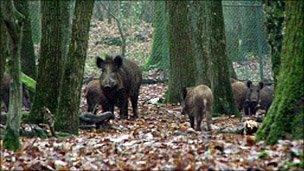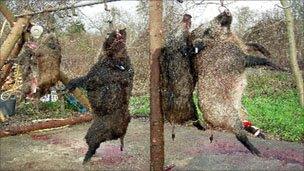French hunters urged to declare war on the boar
- Published

Female wild boar appear to be reproducing at a greater rate than before
French farmers and forestry experts are at a loss to explain a dramatic rise in the numbers of wild boar, apparently linked to increased fertility among the female animals.
Last winter, hunters across the country killed a record 560,000 boar - 10 times more than they were shooting 30 years ago.
But the population is easily replacing itself, and now stands at well over a million.
The problem is not just that the animals cause severe damage to crops and meadowland.
They are also beginning to encroach on areas inhabited by humans. Omnivorous, adaptable and highly mobile, wild boar have been increasingly spotted in town streets and gardens in recent years.
In 2009, they were responsible for nearly 21,000 road accidents across the country. Neighbouring countries including Germany and Italy reported similar problems. Now it is up to the hunters to keep the wild boar population under control
To curb their numbers, the government recently enacted a National Wild Boar Control Plan. This authorises the hunting of boar all year round, in suburban zones as well as the countryside, and at night as well as in the daytime.
Previously hunting for boar was seasonal, as for other game.
"The legislative tools are all there. Now it is up to the hunters to keep the wild boar population under control," said Philippe Jaeger, a country-sports journalist from Alsace in eastern France.
More boar
The reasons for the proliferation are not fully understood.
One factor may have been the huge series of storms that struck France in December 1999. This devastated woodland, blowing over millions of trees which then provided perfect cover for boar.
For several years hunters were, therefore, unable to make a serious impact on their numbers.
In some regions, the generalised planting of maize has also encouraged the animals.
Wild boar love maize, and because the crop grows tall and thick, it also acts as an excellent cover for them - again making the hunters' task all the harder.
"Two or three boar can lay waste to a field in a single night. They trample the stems and then gnaw off the cob," said Pascal Perrotey-Doridant, a claims assessor for a crop damage compensation scheme run by hunt associations in Alsace.
Mr Perrotey-Doridant authorises hundreds of thousands of euros in damages to farmers every year.
Apart from the maize, the worst depredations are on cattle farms. Boar root up the soil looking for worms and grubs. This means that when farmers mow, the ground is uneven and the hay becomes contaminated with earth. This has a bad effect on milk yields.
But the most intriguing question is why female wild boar appear to be reproducing so prodigiously.
"Today the females sometimes have two litters a year. That never used to be the case," said Dorine Pasqualini, an expert at the National Forestry Office.
"They are also starting to breed at a year old instead of two. And they are having more piglets - up to 10 at a time, instead of between four and seven, which was the norm a few years ago.
"So more and larger litters, starting from a younger age - that makes a lot of wild boar."

Fewer and fewer people are taking up hunting
Milder weather has certainly played a part in this. A series of clement winters has meant that the boar population is generally fatter and healthier.
But scientists are also looking at other possibilities. For example, maybe a lack of males - caused by their being singled out by hunters - has led to changes in social behaviour and breeding patterns.
'Hunters' paradise'
One other factor is changing human behaviour.
France may be known as a hunters' paradise, but in fact the number of hunters is falling. This has to do with the declining number of farmers, and the spread of a sedentary, suburban lifestyle.
On a boar shoot in forestry near the village of Erstein in Alsace, it is noticeable that most people are in their 50s or older. There are only a handful of youngsters.
"Most hunters nowadays are quite wealthy people from the cities. They pay a lot of money for the right to shoot, so they want to be sure there are plenty of boar," said Mr Perrotey-Doridant.
"In a way, we have been like sorcerers' apprentices. We have encouraged the boar at the expense of other game, but now their population is out of control.
"It used to be the case that we hunted boar for pleasure. Now we hunt the boar because we have to," he said.
Hunter training
In Alsace, hunters' associations have now invested in a training facility in order to encourage vocations. Unique in France, Cyne'tir is a kind of cinema-cum-shooting gallery in which participants shoot live bullets at a screen projecting images of boar.
"If hunters are properly trained and shoot effectively, then there should be no difficulty keeping the boar numbers down," the country-sports journalist Philippe Jaeger said.
"The problem is that too many hunters nowadays don't know how to do their job."
One positive side effect of the success of the boar has been to revitalise an ancient government institution that goes back to the days of Charlemagne.
The lieutenants de louveterie were created in 812 with the task of organising wolf hunts. Where there was a problem, they had the right to commandeer local manpower for a battue - beating the underbrush and woods - in order to kill the marauding beasts.
Wolves disappeared from France a century ago, but the lieutenants de louveterie were never disbanded.
There are several hundred of them across France, all volunteers. And now their principal job is keeping down the wild boar.